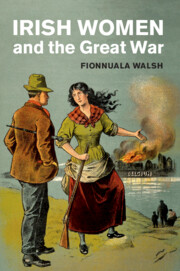Book contents
- Irish Women and the Great War
- Studies in the Social and Cultural History of Modern Warfare
- Irish Women and the Great War
- Copyright page
- Contents
- Tables
- Acknowledgements
- Abbreviations
- Introduction
- 1 Mobilising for the War Effort
- 2 Family, Welfare and Domestic Life
- 3 Social Morality
- 4 Working Lives
- 5 Politicisation
- 6 Demobilisation
- Conclusion
- Select Bibliography
- Index
4 - Working Lives
Published online by Cambridge University Press: 15 July 2020
- Irish Women and the Great War
- Studies in the Social and Cultural History of Modern Warfare
- Irish Women and the Great War
- Copyright page
- Contents
- Tables
- Acknowledgements
- Abbreviations
- Introduction
- 1 Mobilising for the War Effort
- 2 Family, Welfare and Domestic Life
- 3 Social Morality
- 4 Working Lives
- 5 Politicisation
- 6 Demobilisation
- Conclusion
- Select Bibliography
- Index
Summary
This chapter examines the impact of the war on women’s paid employment in diverse sectors including agriculture, domestic service, clerical work, munitions, the railway industry and the medical profession. Providing the first in depth all-island study of Irish women’s employment in this period, it contributes to international scholarship on the emancipatory nature of women’s war work. The chapter assesses the important role played by Irish women in the war industry, particularly through munitions work and questions the extent they were motivated by economic or patriotic factors. The urban/rural experience is contrasted, and the Irish case compared with Britain. Ireland’s economy was very different to Britain in 1914 due to the predominance of the agricultural sector in Ireland and this divergence increased over the course of the war due to the absence of conscription in Ireland. However, there was nevertheless some substitution of men in the Irish workforce and some evidence of a shift in societal attitudes towards female employment. The chapter concludes that the war gave women increased agency as workers, evident in their desire to move away from domestic service and into other sectors, their lobbying for pay increases and their significantly expanded trade union participation.
Keywords
- Type
- Chapter
- Information
- Irish Women and the Great War , pp. 125 - 163Publisher: Cambridge University PressPrint publication year: 2020

